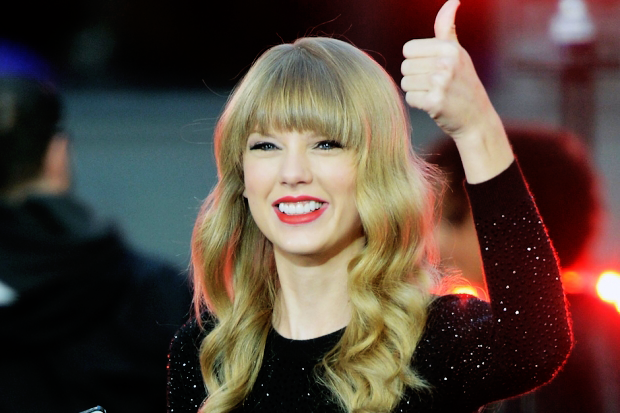Release Date: October 23, 2012
Label: Big Machine
On her fourth album, Nashville’s 22-year-old ambassador to the malls of America is feeling a bit insecure about her status: “We Are Never Ever Getting Back Together” finds her ex listening to “some indie record that’s much cooler than mine”; she and her friends “dress up like hipsters” on “22” and get dissed by the “cool kids.”
It’s never a good idea for megastars to complain about how uncool they are, but she has a point: Aren’t we finished condescending to Taylor Swift yet? If a young female songwriter this talented and consistent were making indie music on Domino Records, would critics find it necessary to congratulate her for writing her own songs or reproach her for naïve sentiments? Have these people ever listened to the xx? Forget Swift’s age (even if she did write “Tim McGraw,” the best teenage lyric since Rimbaud’s “Drunken Boat,” when she was a freshman in high school), her Forever-21-fresh image, her alleged ideological failings, Red is as smart and catchy a collection of tunes as you’ll find on the Internet this year. Pardon me if I hear more vitality and verve in her corniest love-story/break-up anthem than in all the adolescent morosity Justin Vernon wrings from his wounded soul.
Swift’s third album, 2010’s Speak Now, had its boggy moments (though it also had “Dear John,” one of her best songs), but most of record four is on ground as firm as an endless country road in August. There are a few puddles: Taylor, if you’re reading this, the slow ones aren’t working (“featuring Gary Lightbody of Snow Patrol” is not the most promising phrase to see tagged to an MP3 file.) And the vocals could be tighter and less mannered: “The trademark catch in her voice,” Greil Marcus has written, “makes her the third, white-girl member of Destiny’s Child.”
But most of these songs go down like pop punch spiked by pros. The gorgeous “All Too Well” cribs the bassline from U2’s “With or Without You” and dances “’round the kitchen in the refrigerator light.” “Starlight” disco-dazzles Swift right out of her usual AOR persona. On “State of Grace” and “Holy Ground” — which, with their chugging rhythms and guitar filigree, sort of are indie rock, except without the creative-writing-workshop world-wariness — Swift gets staccato over Larry Mullen-sized drums and whoa-oh-oh-oh-whoa cheerleader chants. And “We Are Never Ever Getting Back Together,” co-written with Max Martin, is the best hit Kelly Clarkson never had, a venomous confection of processed guitars. It’s a monster. You can hear the Bubblicious smacking in Hot Topics across the land as Taylor Nation sings along.

Also Read
Choppered and Tuned
Is it country? Country fans and country radio seem to think so. The question usually just reveals the ignorance of its asker. Listen to Jerrod Niemann’s “Free the Music,” Keith Urban’s “Used to the Pain,” the Band Perry’s “Miss You Being Gone,” or Miranda Lambert’s “Kerosene,” then get back to me about what country music is. My answer: the most dynamically vibrant pop genre of the last decade or so. Sure, the tropes that, like the “autumn leaves” of “All Too Well,” “fall down like pieces into place” are generic enough to fit any genre. On Red, someone has “a new Maserati,” but only “dead-end streets” and “little town streets” to drive it down. Autumn’s a season of mists; summers, boys pick you up on the boardwalk, you sing along with the car radio, then they stop calling. “I forget about you long enough to forget why I needed to”; “All love ever does is break and burn and end / But on a Wednesday in a café I watched it begin again.” And “the story’s got dust on every page.”
It’s just that country has been, for some time, the genre with the least need to be humorless about its own identity (Brad Paisley’s “This Is Country Music” is funny). Is “All love ever does is break and burn and end” too earnest for you, even with its tail of Donnean iambs? Country’s very hospitality to the unironic — Springsteen surges, Bon Jovi licks — is what gives it the scope of actual irony, dialectical and reflective: “happy, free, confused, and lonely at the same time,” as Swift puts it on “22.”
Whatever it is, this music is full of adult pleasures, even if the most explicit image Swift offers is of an ex-boyfriend sniffing her scarf because it smells like her. On Red — the color of blood and lipstick and fire and Southern dirt and hearts and conservatism and tractors and communism and sin, this last a word whose charged valence here might discomfit know-it-alls who would never use it without scare quotes — Swift’s too smart and tuneful to condescend to her contradictions. Or to yours.




